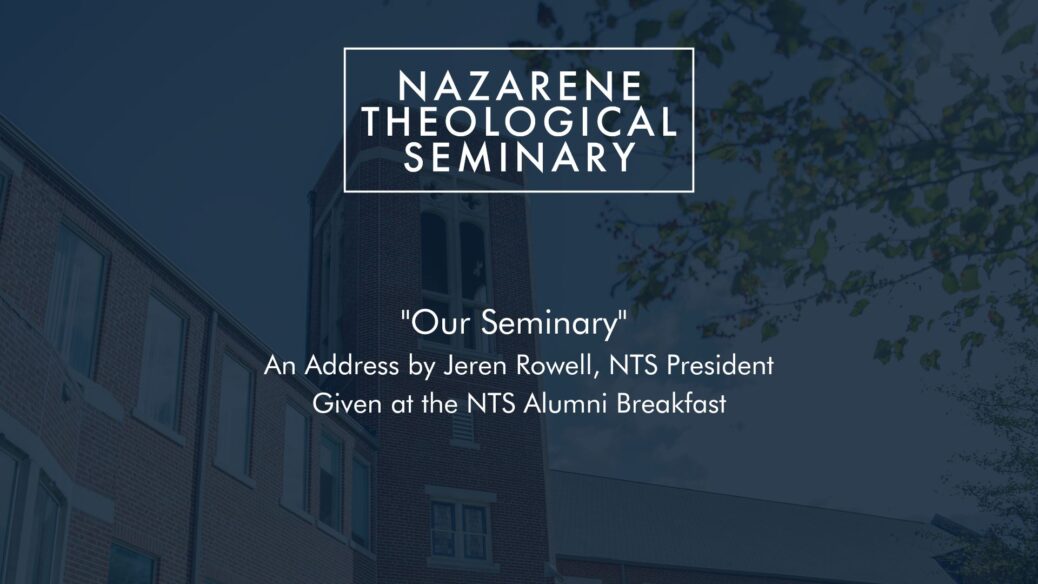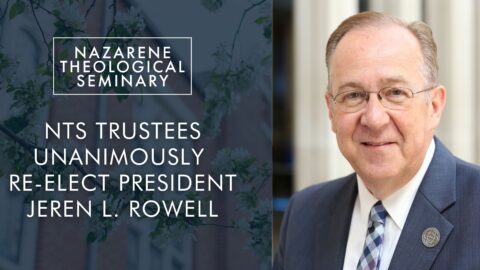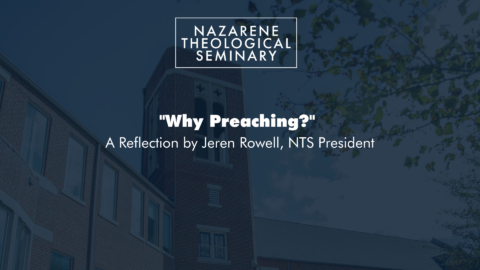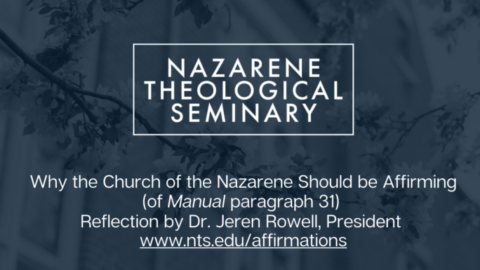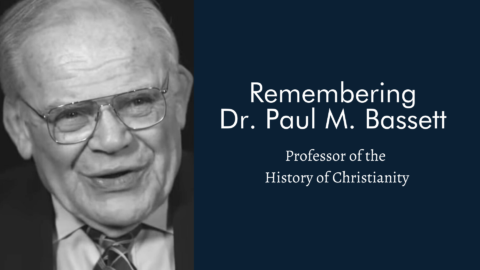Watch the J.B. Chapman promo video, which was shown at the NTS Alumni Breakfast (5 min., 55 sec.).
Watch the “Our Seminary” presentation by President Jeren Rowell (17 min., 31 sec.), which was taped after the 2023 NTS Alumni Breakfast.
Greetings in the name of our crucified, risen, and ascended Lord Jesus Christ. Thank you for your connection to and engagement with Nazarene Theological Seminary. It is, as Dr. Chapman put it, “our” seminary. I hope you feel that way about it.
I have been thinking much about this language – “our seminary.” That’s how we talk about NTS, you know, across the generations and across the church. I grew up in this Church (fourth generation) hearing my own people speak with great affection and appreciation for “our seminary.” Truth is, I can also remember hearing that phrase from a posture of concern or confusion, as in, “What in the world is happening at our seminary?”
Do you recognize the phrase in those ways? Sometimes “our seminary” is used in a way that is friendly and proud. Other times, people say “our seminary” as a prayer concern. Either way, it is still “our” seminary. I don’t know how this may strike you, but I find this reality to be both inspiring and instructive.
It is inspiring to me in that it signals one of the best things about the general ethos of the Church of the Nazarene: for good or ill, we are in this together. Nothing emphasizes this familial connection any better than our gathering of a General Assembly. It has all the markings of a family gathering: joy, reunion, anxiety, laughter, arguing, storming out, coming back, conversation, table fellowship, and in the end, a commitment to keep at it because it is bigger than us, more important than us; somehow it is “ours” together in way that it could never be “ours” individually.
I think this is what General Superintendent J. B. Chapman may have had in mind when he gave his inaugural charge in 1945 to Dr. Hugh C. Benner, our first president. He titled his remarks on that day, “What We Expect of Our Seminary.” Chapman, you may recall, had invested a good deal of effort in casting a vison across the Church for establishing a theological seminary. It wasn’t easy. He himself said, “There are, of course, those who hold to doubts concerning the usefulness of the Seminary.”
Chapman began publicly casting this vision as early as 1928, no doubt earlier than that, but this is when the Herald of Holiness editorial appeared, “More Preachers and Better Preachers Are Needed.” Dr. Chapman recognized that in the grassroots nature of our movement, graduate level study might not be for everyone, but he noted that for the movement to find sustainability, we need “a certain percentage [of pastors] who have had college training and seminary advantages.”1 Later, in that first inauguration address, he went on to spell it out a bit more. As the seminary opened, he said:
We expect that the men and women who come here will be better preachers than they would have been if they had not come. And a little improvement on the part of many will justify our efforts. From this institution in the future will come, we believe, sound, efficient men and women of God to extend the border of our Zion, to help our church stay orthodox and spiritual, to contribute to our literature, and to give tone and standing to our church everywhere.2
Do you hear it? Chapman’s vision was not simply for the distribution of theological content, or for the certification of ministers with diplomas and degrees. His vision was about the necessary missional connection of theological inquiry and proclamation of the gospel. I think he was hoping that a Nazarene seminary might be able to bridge the gap (sometimes chasm) between the academy and the church.
He said to Dr. Benner that day, “Always remember that the Seminary is the creature of the church, and not the church the creature of the Seminary.” I think he was saying, in part, that the Seminary is “ours” not simply in terms of ownership and responsibility; it is “ours” especially in terms of shared purpose and mission.
I love this centrist, mediating way of holding together “knowledge and vital piety,” as Charles Wesley put it. The fact is, this “our seminary” posture is easier said than done. Even as Dr. Benner was working to establish the curriculum and call the first faculty, he had to face many in the Church who opposed the work.
I am simply saying that the ”our” is not easy, never has been, but it is absolutely necessary. If we lose the “our” of NTS, it cannot be what our forebears envisioned. This is why I am inviting we who have a vested interest in the seminary, to refresh in our hearts and in our practices a commitment to the thriving of “our seminary.”
I want to share with you some specific ways that together we can renew the commitment to “our seminary.” Just before I get to those, however, let me share not only how this language inspires but also how it may instruct. Three simple ideas:
First, I think the idea of “our seminary” carries instructive implications regarding the sense of legacy which shapes how we understand NTS in this present moment. Legacy is important as it keeps before us the materials of our heritage. Several components have already been named: the prayerful vision of Dr. Chapman, the faith of the 1944 General Assembly, the pioneering work of Hugh C. Benner and the first faculty, and the legacy of leadership God gave us in Presidents: Corlett, Stowe, Greathouse, Nease, Sanders, Wetmore, Benefiel, Busic, and Sunberg. There is also the legacy of Nazarenes (and others) who have faithfully and sacrificially given material resources to advance the mission. Legacy is not simply nostalgia. In fact, nostalgia for its own sake, as I was recently reminded by a colleague, can be a deadly spiritual disease that turns the beauty of memory into faithless yearning for the old ways simply for their comfort.3
It is not uncommon to hear from alumni stories of the “good ol’ days” of former teachers, former programs, former experiences, even precious memories of moments in the building on East Meyer Boulevard. These wonderful stories represent the good work God has done among us, but they must never become crippling restrictions to the fresh imagination that the Spirit of God wants to breathe into our ministry.
A second instructive implication is found right there: the power of story. Perhaps in some way NTS became part of your story. Our alumni love to tell the stories of NTS days, stories that eventually get around to Dr. Grider. But notice that what makes NTS “our” seminary is so much more than shared stories that are nostalgic, but shared stories that continue to shape how we understand why we have a seminary and why it matters to the Church.
The third instructive implication I see in this language of “our seminary” is that the relational nature of this language tells us that the NTS experience is much more than theological education, it is holistic formation which is our mission and task. Let us recall the expression of our mission as Nazarene Theological Seminary:
The Mission of Nazarene Theological Seminary is to form faithful and effective ministers of the Gospel of Jesus Christ to participate in the reconciling of the world to God. – 2 Corinthians 5:18-20
Inside this mission, our core values are:
- To explore and develop the Wesleyan-holiness tradition, as a graduate school of theology
- To support the calling of women and men in ministry
- To know and love the Lord, walk with the Lord, and speak of the Lord with charity and hospitality
- To ground persons in the community of faith and in theological disciplines for the practice of ministry in diverse contexts throughout the world
- To serve as a theological resource for the church, particularly the Church of the Nazarene
These commitments form the functional heart of our seminary. Our new Dean of Faculty, Dr. Sarah Coleson-Derck, expressed it beautifully in her installation address with the intriguing phrase, “holy curiosity.” She is talking about “championing the Seminary as a place wherein the spiritual exercise of Christlike curiosity is learned and practiced with humility.”4 This kind of formational posture is critical because, as Dr. Sarah notes, “Incurious ministers are dangerous leaders.”5
As we often say at NTS, “Theological education is not about equipping you with every right answer, but about training you in the habits and resources for holy curiosity, so that even after we have answered some of your questions together, you keep wondering with God what those answers mean for your people, and how those answers should or should not manifest in your ministry.”6
I suspect this is the kind of thing that Dr. Paul Bassett had in mind when he said, “Learning at NTS is an act of worship.”7 I love the way one of our graduates this year expressed it when he wrote:
It would be hard to overestimate the impact that Nazarene Theological Seminary’s M.Div. program has had on my formation as a minister because of the myriad of ways in which it impacted me. I can confidently say that I would not be anywhere near as prepared for the ministerial task ahead of me if it were not for the classes, books, professors, and peers from which I have learned. I believe that seminary has increased my ability to exegete Scriptures faithfully, engage in the work of theology with both confidence and humility, and ultimately use all those skills effectively as a pastor among God’s flock.8
This is the kind of sacred stewardship that I find most compelling. And now, what we have been handed is ours to steward through this tumultuous season and into a new chapter of what the Holy Spirit is bringing to us. The worst we could do right now is to divide ourselves against one another as cultural forces beckon us toward extremes. The best we can do is to own the “our” which thrives in the hard work of the via media.
So, what does this mean for the next immediate season of the NTS story? Briefly, here are four ways that I would extend uniquely to you, the alumni and friends of NTS, to join us in developing the mission of our seminary:
- Join me in praying the three things that I pray daily for NTS:
a. That God will keep calling women and men to a life of vocational ministry.
b. That God will inspire generous people to give the necessary resources
c. That God will grant NTS favor in the eyes of the Church. - Advocate for accessibility to an NTS education. Currently, less than 15% of USA/Canada pastors are alumni of Nazarene Theological Seminary. And yet, consistently these pastors lead the denomination in missional effectiveness as measured by the Annual Pastor’s Report. A key part of this advocacy is working with undergraduate students from your respective fields, casting a vision for them of how seminary formation can shape a sustainable ministry. Dr. Chapman, in that inaugural address, noted the visceral connection between our colleges and our seminary. He said, “If our colleges do well, we shall have need of the Seminary. If they do not do well, the Seminary will perish for want of material.” Let us accept shared responsibility for advocacy toward our seminary; not for survival of an institution, but for the unique experience of graduate theological formation that directly impacts our mission.
- Talk to us about the ongoing development of responsive programs. We want to be partners with you in the work of forming faithful and effective ministers. We are not interested simply in handing out degrees. We want to be part of solving contextual challenges as we learn how to gain a hearing for the gospel in contemporary cultures. If you become concerned about what NTS is doing or about what you think NTS might be doing (or not doing), please do not simply take shots from the distance of social media, and please do not gossip (I think the Bible says something about that), please talk to us. Call, email, let us take you to coffee when we’re around your area. After all, this is “our” seminary.
- Affirm the importance of our seminary as a locus of theological research for the Church. NTS has historically been important to the Church not only in the formation of its ministers, but also as a theological resource for the Church as we confront the perplexing and difficult challenges of our time. Historically, many of us remember that when the General Assembly was anxious about the emerging complexities of scientific developments that challenged our understanding of the sanctity of human life, it was NTS faculty that largely gave articulation to what is now Manual paragraph 30. During former days of cultural challenge around the important ideas of marriage and the real experience of divorce among our people, it was NTS faculty who largely gave articulation to a way through that difficult moment. This connection continues into our recent Assembly. Most importantly, the resource of NTS is critical to the doctrinal confessions of our faith as expressed in the Articles of Faith and the Agreed Statement of Belief. Clearly the theological resources of our denomination have developed to include voices from across the fifty global educational partners. But let us not lose sight of the anchoring presence of our seminary in this regard.
Would you prayerfully consider joining me in these practices? Pray, advocate, give, talk to us, and affirm the good idea of our seminary. Thank you for joining with me and with all of us at NTS to steward well this beautiful gift that the Church has handed to us. I believe that NTS has a bright future and will continue to be at the consequential center of our theological identity and our practices of ministry.
The board, faculty, and staff of NTS are giving our best to steward this sacred gift well. But it’s not all on us … we invite you to steward this gift with us …
Because … it is “Our” Seminary.
Dr. Jeren Rowell
President and Professor of Pastoral Ministry
References
1 Herald of Holiness, March 14, 1928.
2 J. B. Chapman, “What We Expect of Our Seminary,” NTS Tower, Vol 1, No. 1, Winter 1945: 17.
3 Acknowledgement to Dr. Gordon Smith for this idea.
4 Sarah Coleson-Derck, “The Work of Holy Curiosity,” Didache, Vol 22, No 2: 2. (accessed May 30, 2023).
5 Coleson-Derck, “Holy Curiosity,” 3.
6 Coleson-Derck, “Holy Curiosity,” 4.
7 Paul Bassett, NTS Convocation Address, 2002.
8 Mitchell Birnell, 2023.
9 J. B. Chapman, “What We Expect,” 4.

